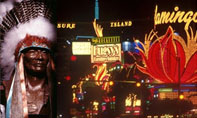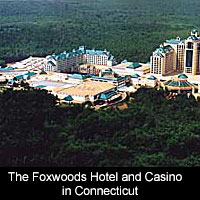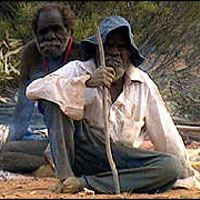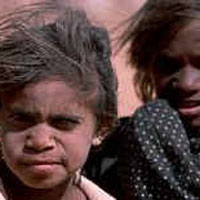- About Us
- Columns
- Letters
- Cartoons
- The Udder Limits
- Archives
- Ezy Reading Archive
- 2024 Cud Archives
- 2023 Cud Archives
- 2022 Cud Archives
- 2021 Cud Archives
- 2020 Cud Archives
- 2015-2019
- 2010-2014
- 2004-2009
 |
Ezy Reading: Restitution Takes A Roll of the Dice |
I recently had the chance to speak with a former Maine state legislator about local politics in the region and our conversation turned to the issue of Native American Indian gaming licences.
Though Maine doesn’t have any Indian casinos there are tribes who have secured licences for operating such activities as bingo halls. In the larger United States, however, especially in the case of those reservations close to large urban centres, Indians casinos have been an incredible success; a windfall of profit and prosperity for tribes and communities that had previously been trapped in conditions of sub-standard squalor, limited access to quality health care and education, and very little opportunity for improvement.
 The Indian Gaming Regulatory Act (IGRA) of 1987 was the culmination of a long period of legal wrangling but opened the door for federally recognised tribes to conduct certain gaming operations with the approval of the state (who of course, receive a portion of revenue in return). There have naturally been instances where some of the Indian casinos did not succeed, and where tribe strife has erupted amid corruption and inter-factionalism. Further, it cannot be denied that casinos and gambling of any kind do, of course, invite any number of additional social problems within the wider community, including addiction, crime and prostitution, however at least in respect to many of these American Indian tribes, the casino ‘experiment’ has been a happy one.
The Indian Gaming Regulatory Act (IGRA) of 1987 was the culmination of a long period of legal wrangling but opened the door for federally recognised tribes to conduct certain gaming operations with the approval of the state (who of course, receive a portion of revenue in return). There have naturally been instances where some of the Indian casinos did not succeed, and where tribe strife has erupted amid corruption and inter-factionalism. Further, it cannot be denied that casinos and gambling of any kind do, of course, invite any number of additional social problems within the wider community, including addiction, crime and prostitution, however at least in respect to many of these American Indian tribes, the casino ‘experiment’ has been a happy one.
And while I’d never go so far as to suggest that improved finances from a roulette wheel and a couple of slot machines would ever, ever make up for the degree of loss and devastation suffered by American Indians over the past two hundred years, it is at the very least something that gaming licences have improved a few key aspects of many tribe’s present and future lots in life, and opened up opportunities for them that would not have been there otherwise.
 In Australia, of course, we’re still sadly deficient in the extent of support and ‘restitution’ that we’ve provided to the native Aboriginal population for two hundred years of white men’s misdeeds. Again, finances are by no means a total answer, and in fact Prime Minister John Howard issuing a symbolic formal apology to the Aboriginal people for the actions of previous governments would perhaps hold more long-term value than many other concessions currently on offer.
In Australia, of course, we’re still sadly deficient in the extent of support and ‘restitution’ that we’ve provided to the native Aboriginal population for two hundred years of white men’s misdeeds. Again, finances are by no means a total answer, and in fact Prime Minister John Howard issuing a symbolic formal apology to the Aboriginal people for the actions of previous governments would perhaps hold more long-term value than many other concessions currently on offer.
I’ve no idea of the extent of legal and other complications that would be involved in extending gaming rights to Aboriginal tribes in Australia, and I am certain it would meet immense opposition from many circles, and perhaps from within the Aboriginal community itself. But observations of the Indian casino model and the ongoing squalor and deprivation that so many native Australians are forced to live in could suggest that such an opportunity –even though an ill in itself- might be a worthy avenue to pursue because it is simply so much better than any other available solutions. At the very least, if the Mabo decision and Prime Minister John Howard haven’t yet extended to tribes a real chance to live on quality land, in well built homes and with the best education, medical care and benefits possible, then maybe the misspent dollars of regular Australian men and women can?
 Yes, it’s risky, but perhaps with a mix of advice from American Indians (few allow their own community members to frequent the casinos, for instance, which is solid policy), a degree of government regulation, firm tribal leadership, and cautious steps forward, this could be a swift provision source of potential revenue and an improved quality of life for many Aboriginals in Australia today.
Yes, it’s risky, but perhaps with a mix of advice from American Indians (few allow their own community members to frequent the casinos, for instance, which is solid policy), a degree of government regulation, firm tribal leadership, and cautious steps forward, this could be a swift provision source of potential revenue and an improved quality of life for many Aboriginals in Australia today.
Ezy Reading is out every Monday.
